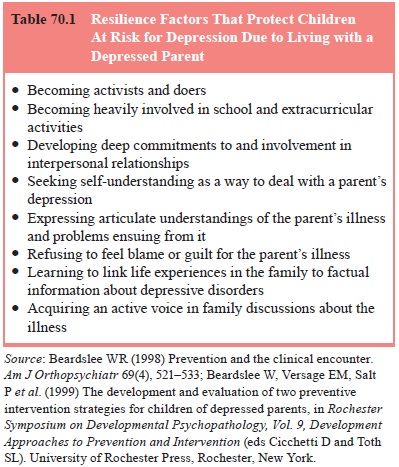Chapter: Essentials of Psychiatry: Family Therapy
Family Resilience Therapies
Family
Resilience Therapies
While
family psychoeducation approaches have focused on roles that families can play
in reducing frequency of illness relapse or buffering its severity, family
resilience interventions extend this strategy to identify salutary family
processes that not only buffer severity of illness, but prevent its onset for
those at risk. Key processes can be identified that enable couples and families
fac-ing disruptive crises or persistent stresses to strengthen relation-ships,
regain functioning and further the growth of its individual members (Walsh,
1998; Wolin and Wolin, 1993).
Family
resilience refers to coping and adaptational proc-esses in the family as a
functional unit (Walsh, 1998; Wolin and Wolin, 1993). From this perspective, a
stressor affects at-risk chil-dren only to the extent that they disrupt crucial
family processes that otherwise would neutralize or buffer the stressor
(Patterson, 1983). Family resilience rests upon several systemic principles:
·
The hardiness of individuals is best understood and
fostered in the context of the family and larger social world, as a mutual
in-teraction of individual, family and environmental processes.
·
Crisis events and persistent stresses affect the
entire family, posing risks not only for individual dysfunction but for
rela-tional conflict and family breakdown.
·
Family processes mediate the impact of stress on
all members and their relationships, with protective processes fostering
resilience by buffering stress and promoting recovery, and maladaptive
responses heightening vulnerability and risks for individual and relationship
distress.
·
All families have the potential for resilience,
which can be maximized by encouraging their best efforts and strengthen-ing key
processes.
With
programs such as Beardslee’s (Beardslee et al., 1999), family resilience
programs have moved past treatment of acute illness and relapse prevention, to
primary prevention of the

disorder
itself. Such programs identify risk factors and protective factors for onset of
illness; relate these factors to family organiza-tion, communications, and
knowledge of the disorder; and design family interventions that enhance family
understanding, attenu-ate risk factors, and amplify protective factors (see
Table 70.1).
Related Topics